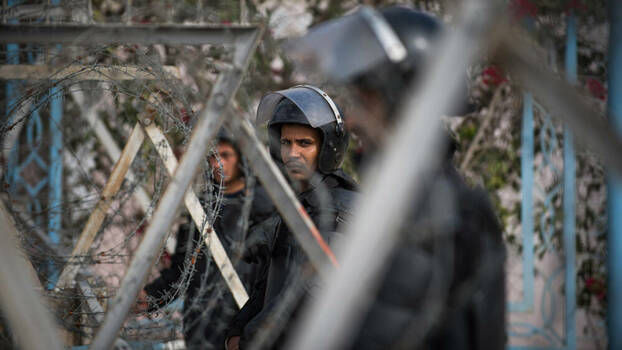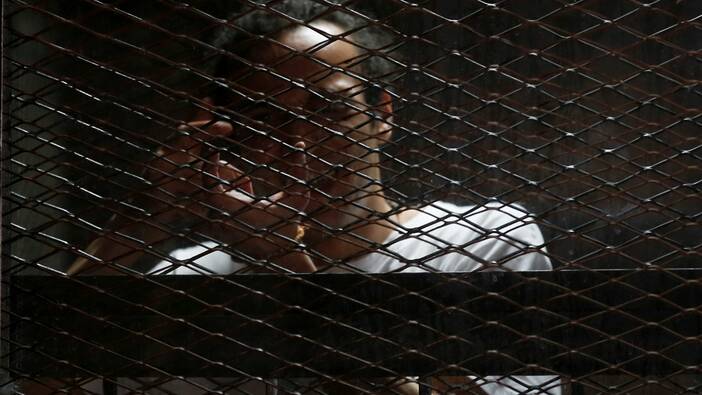
The slogan “System Change, Not Climate Change” might have originated with the radical Left, but today it has long become mainstream, and can be seen and heard at climate mobilizations across the Global North. In Berlin, I see it sprayed on walls, raised on banners, and printed on stickers. Yet increasingly, these seemingly powerful words risk becoming empty rhetoric, as dictators around the world attempt to hijack the climate agenda to greenwash their dismal human rights records.
Hossam el-Hamalawy is an Egyptian journalist and socialist activist. He’s currently based in Berlin, where he is completing his PhD on the Egyptian security services’ role in the counterrevolution.
This November, hundreds of government officials, NGO representatives, and others will gather in Sharm el-Sheikh along Egypt’s Red Sea coast to attend the twenty-seventh United Nations Climate Change Conference, COP27. The host, Egyptian President Abdel Fattah el-Sisi, is quoted on the conference’s website as calling it “an opportunity to showcase unity against an existential threat that we can only overcome through concerted action and effective implementation”.
The conference raises a serious political and ethical dilemma for anyone claiming to stand for democracy and human rights. It’s problematic enough that a regime known for its abysmal human rights and environmental record is the official host. The fact that Coca-Cola is the official event sponsor borders on farce.
One German NGO official whom I met recently in Berlin argued in favour of attending, as the conference could still present a venue for some partners in the Global South to voice their demands. Other European campaigners whom I came across on social media suggest participating in the conference while organizing some sort of protest action on the side, such as wearing “#FreeAlaa” T-shirts in solidarity with the country’s prominent dissident, Alaa Abd el-Fattah, who is currently on hunger strike.
But the fact is, good intentions aside, holding the COP27 in Sharm sends a clear message to the Egyptian people that they are alone in their struggle for democracy and against regime-made environmental disasters.
Las Vegas on the Red Sea
The conference will be held in Sharm, located at the southern tip of the Sinai peninsula. The sprawling town, littered with five-star hotels and casinos, used to be the favourite holiday destination and later place of exile for Egypt’s former tyrant, Hosni Mubarak. It caters primarily to the country’s wealthy elites, upper-middle classes, and foreign tourists.
Ordinary Egyptians from the Nile Valley are usually stopped when crossing the Suez Canal into Sinai. They are vetted by security agents, who check their IDs and size up passengers, only allowing wealthy-looking Egyptians to enter. Those who appear poor, or whose IDs do not list home addresses in an upscale Cairo neighbourhood or a “respectable” profession, are required to present a “work permit” to be granted access. Otherwise they are sent back, or even detained for questioning.
The indigenous Sinai Bedouins are not usually welcome in the town, although their grandfathers have roamed and settled there for generations. At some point, the Egyptian state considered building a concrete wall to separate Sharm from the north of the peninsula to restrict the movement of the indigenous Bedouin tribes.
Sisi and his ilk are part of that system and thus part of the problem, not someone to ‘showcase unity’ with at an international climate conference.
A good portion of Sharm hotels and conference centres are either owned or operated by the military and the intelligence services. Government agents, whether uniformed or undercover, comb the town regularly. Surveillance is part of the tourism package.
A three-hour drive from Sharm lies the ancient monastery and surrounding town of St. Catherine, a UNESCO World Heritage Site and the oldest continuously operating Christian monastery in the world. Here, the COP27 host is currently engaged in a number of disastrous “development” projects, effectively causing the site’s environmental devastation.
Roughly 400 kilometres away from where the COP27 summit will be held lie the ruins of the once bustling border town of Rafah. Beginning in 2014, the Egyptian army literally razed the entire town to the ground and forcefully displaced its population as part of Sisi’s dirty war in the northern part of the peninsula.
The “war on terror” in the Sinai peninsula, which dates back to a spate of 2004 bombings targeting tourist hotels in the resort town of Saba, began as a police operation responding to sporadic attacks. Mubarak then deployed his State Security Investigations Service, the Egyptian secret police, to inflict collective punishment on the local population, rounding up and torturing thousands.
It was only after the Sisi-led coup in July 2013, however, that the security situation deteriorated into a full-fledged insurgency. Initially, military top brass promised the government’s counterinsurgency operations would succeed “within days”, but they soon found themselves embroiled in a long war lasting for nearly a decade. Gross human rights abuses against the indigenous population were rampant.
Fighter jets attacked alleged terror targets with cluster bombs. Trigger-happy soldiers stationed at military checkpoints opened fire on civilians indiscriminately. Horrifying eye-witness accounts and documented reports evidence widespread torture against suspects detained in army barracks in Arish, the provincial capital. Detainees are kidnapped and regularly forcefully disappeared. Others are subject to summary executions.
The military’s sheer brutality helped to create fertile ground for the insurgents to recruit. It took the Egyptian army almost ten years to put down the militants, whose strength security analysts estimate to be no more than somewhere between 800 to 1,200 fighters.
Stay updated with Egypt solidarity campaigns:
Egypt Solidarity
COP Civic Space
As was to be expected, human rights activists’ calls to address the grievances of the indigenous Sinai population at COP27 have fallen on deaf ears in a country where it is illegal to dispute the military’s account of events related to the war on terror. Few know this better than the journalist Ismail al-Iskandrani, who is currently serving ten years in prison after a military tribunal convicted him for his independent reporting on the Sinai that questioned the state’s narrative.
The Perfect Military Camp
The Nile Valley, where roughly 95 percent of Egypt’s 102 million people live, makes up only 5 percent of the country’s total landmass. It is among the densest living spaces in the world and also, especially since the 2013 coup, one of the most tightly surveilled.
Soon after then-Minister of Defence Sisi deposed the country’s first democratically elected president on 3 July 2013, he unleashed the state’s repressive organs to crush the revolution that began in 2011. The army and the police carried out a series of massacres against peaceful protesters in the following months, including the biggest massacre in the history of modern Egypt, in Raba’a and al-Nahda Squares.
Security forces stormed university campuses, killed students in broad daylight and rounded up others before putting them on trial in kangaroo courts. The rolling crackdowns against all shades of dissent prompted an expansion of Egypt’s prison system, with sprawling prison complexes confining thousands of political detainees under terrible conditions.
We can’t stop COP27 from taking place, but we can make sure it won’t be a stage for greenwashing Sisi’s brutal record.
The regime’s intelligence services have also taken control of the entire media industry. Journalists, artists, and writers are targeted and silenced. Mass arrests of people in the LGBTQ community are conducted on a widespread scale.
The websites of hundreds of news and human rights organizations are blocked, and the use of VPNs is banned. The regime employs mass surveillance against internet users. By the end of 2021, the Committee to Protect Journalists listed Egypt as the third-worst jailer of journalists in the world.
Simultaneous to the crackdown on dissent, Sisi has declared what critics call a “war on green” in the cities, culling trees and demolishing public parks across Cairo and the provinces, while pouring billions of dollars into white elephant projects in the Egyptian desert. The situation in Cairo and other urban centres in Egypt today has come to resemble the most dystopian versions of Michel Foucault’s description of the modern city as a form of military camp.
Solidarity against Sisi’s System
Given all of these crimes, Sisi’s regime should be treated as a pariah. Its functionaries abroad should be boycotted. Its generals, who directly run the Egyptian torture apparatus, should be put on watchlists, arrested, and tried for crimes against humanity. Joint cooperation and sales of surveillance technology and arms to Egypt’s military and security services must be stopped.
Unfortunately, the opposite has been the case. Since taking power, Sisi has cooperated closely with the West on things like the so-called “war on terror” and measures to fight “illegal immigration”, cut major arms deals, and hosted global conferences like COP27. European governments have proven largely indifferent to the human rights situation in Egypt. Democracy and civil liberties, regularly cited as eminently “European values” by politicians of all stripes, appear to count for little in the face of lucrative business deals and the promise of keeping African migrants off European shores.
Egyptian dissidents and exiles do not have the luxury of looking the other away. They continue to fight Sisi, and look to friends and allies — not governments — in both the Global North and South for solidarity. We appeal to trade unions, NGOs, student associations, environmental campaigns, and political parties to raise your voices about the political situation in Egypt and call out your governments for working with such a criminal regime.
If we mean it when we say “system change, not climate change”, we have to talk about what that system is. The system we need to change is not some abstract capitalist model that exists on paper, but an interlocking matrix of governments, corporations, and social elites whose destructive way of producing and distributing wealth threatens to bring about the demise of life on the planet. Sisi and his ilk are part of that system and thus part of the problem, not someone to “showcase unity” with at an international climate conference.
We can’t stop COP27 from taking place, but we can make sure it won’t be a stage for greenwashing Sisi’s brutal record. As COP27 turns the world’s attention to Egypt, the Egyptian opposition needs you to lobby your elected officials to halt arms sales to Sisi’s military regime. We need you to pressure your governments to prioritize human rights over economic profit in foreign policy. We need you to protest in front of the Egyptian embassies and consulates in your countries, in solidarity with Sisi’s political prisoners and all Egyptians who have been crushed under his illegitimate rule.
